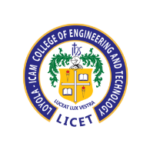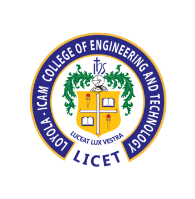Electronics and Communication Engineering
Outcome Based Education
Program Outcomes
PO 1 – Engineering knowledge: Apply the knowledge of mathematics, science, engineering fundamentals, and an engineering specialisation for the solution of complex engineering problems.
PO 2 – Problem analysis: Identify, formulate, research literature, and analyse complex engineering problems reaching substantiated conclusions using first principles of mathematics, natural sciences, and engineering sciences.
PO 3 – Design/Development of Solutions: Design solutions for complex engineering problems and design system components or processes that meet the specified needs with appropriate consideration for public health and safety, and cultural, societal, and environmental considerations.
PO 4 – Conduct investigations of complex problems: Use research-based knowledge and research methods including design of experiments, analysis and interpretation of data, and synthesis of the information to provide valid conclusions.
PO 5 – Modern tool usage: Create, select, and apply appropriate techniques, resources, and modern engineering and IT tools including prediction and modelling to complex engineering activities with an understanding of the limitations.
PO 6 – The engineer and society: Apply reasoning informed by the contextual knowledge to assess societal, health, safety, legal, and cultural issues and the consequent responsibilities relevant to the professional engineering practice.
PO 7 – Environment and sustainability: Understand the impact of the professional engineering solutions in societal and environmental contexts, and demonstrate the knowledge of, and the need for sustainable development.
PO 8 – Ethics: Apply ethical principles and commit to professional ethics and responsibilities and norms of the engineering practice.
PO 9 – Individual and team work: Function effectively as an individual, and as a member or leader in diverse teams, and in multidisciplinary settings.
PO 10 – Communication: Communicate effectively on complex engineering activities with the engineering community and with the society at large, such as being able to comprehend and write effective reports and design documentation, make effective presentations, and give and receive clear instructions.
PO 11 – Project management and finance: Demonstrate knowledge and understanding of the engineering and management principles and apply these to one’s work, as a member and leader in a team, to manage projects and in multidisciplinary environments.
PO 12 – Life-long learning: Recognise the need for, and have the preparation and ability to engage in independent and life-long learning in the broadest context of technological change.
Program educational objectives
Graduates will be able to,
PEO1: Apply the acquired mathematical, scientific and engineering skills to meet the growing challenges of the industry, pursue higher education, and research.
PEO2: Provide solutions to contemporary engineering problems in the fields of Electronics and Communication engineering by employing modern techniques and tools.
PEO3: Exhibit leadership skills and work as team to provide solutions that address the societal, global, and environmental issues.
PEO4: Engage in lifelong learning and adapt to trending technologies for sustained career advancement.
Program specific outcomes
Graduates will be able to,
PSO1: Identify, analyze and design Electronics and Communication systems for providing solutions to societal problems by applying core engineering principles.
PSO2: Ideate and formulate solutions for engineering problems in real-time computing and embedded systems by adapting emerging technologies.





